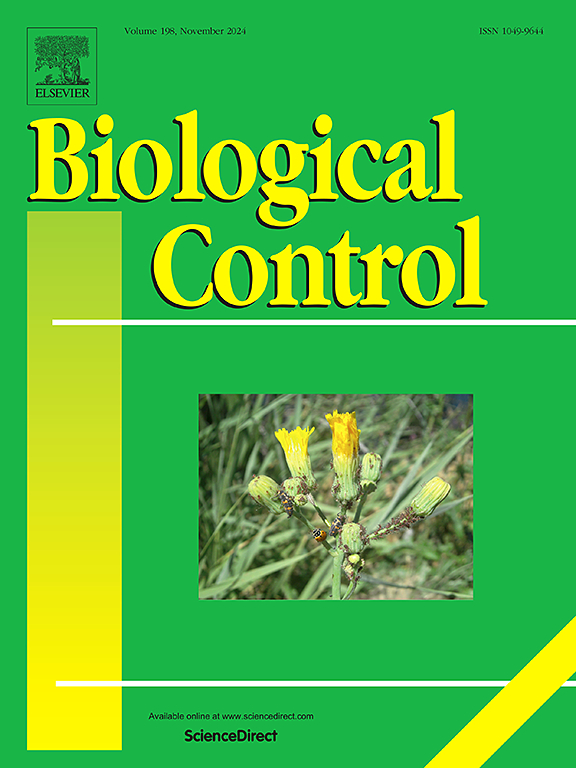豆科衍生酚酸对尖孢镰刀菌的影响。推拉式斯特拉菌系统对斯特拉菌的相容性及生物防治潜力
IF 3.4
2区 农林科学
Q2 BIOTECHNOLOGY & APPLIED MICROBIOLOGY
引用次数: 0
摘要
褐曲菌的生物防治Benth。包括推拉、豆科作物间作和土传真菌,如尖孢镰刀菌。strigae (FOS)提交。这两种技术的功效都受到各种环境因素的影响。将它们结合起来可以潜在地克服它们的局限性,增强对月牙霉的控制。据推测,FOS接种与推挽间作兼容,从而实现对月季花的一致抑制。研究了3种豆科植物(麻豆、棘豆和芥菜)的酚酸和粗根分泌物对FOS菌丝生长和孢子萌发的影响。生物测定表明,大多数酚酸(如咖啡酸、对羟基苯甲酸、丁香酸)对FOS的发育没有影响,只有胡椒酰酸(80%、38%)和t-肉桂酸(53%、33%)在浓度分别为1和0.5 mM时强烈抑制FOS的生长。Crotalaria粗根分泌物在1(44%)和0.5 (32%)mg ml-1时抑制FOS菌丝生长。Desmodium和Mucuna渗出物无抑制作用。温室试验结果表明,豆科作物间作和接种大豆寡糖可减少玉米月季黑穗病的出苗,两者结合可抑制95%以上的产量,提高玉米生物量。豆科植物的存在促进了FOS的增殖,豆科植物Mucuna和Desmodium使FOS基因拷贝数增加了44%以上。LC-MS分析鉴定出9种酚酸,其中对香豆酸(85 ~ 128µg g−1)和对羟基苯甲酸(50 ~ 97µg g−1)含量最多;后者与FOS丰度正相关。在这种情况下,豆科作物与玉米间作不影响FOS在根际土壤中的增殖,并有效地抑制了红僵菌的生长,证明了FOS接种与推拉接种的兼容性,可以有效地管理红僵菌。本文章由计算机程序翻译,如有差异,请以英文原文为准。
Legume-derived phenolic acids influence Fusarium oxysporum f.sp. strigae compatibility and biocontrol potential in a Striga push–pull system
Biological control of Striga hermonthica (Del.) Benth. includes push–pull, intercropping using legumes, and soil-borne fungi such as Fusarium oxysporum f.sp. strigae (FOS). Efficacy of both technologies is compromised by various environmental factors. Combining them could potentially overcome their limitations and enhance control of S. hermonthica. It was hypothesized that FOS inoculation is compatible with push–pull intercropping, allowing consistent S. hermonthica suppression. Effects of selected phenolic acids and crude root exudates from three legume species (Mucuna pruriens, Desmodium uncinatum, Crotalaria juncea) on FOS mycelial growth and spore germination were studied. Bioassays showed that most phenolic acids (e.g., caffeic, p-hydroxybenzoic, syringic) had no effect on FOS development, except for piperonylic (80 %, 38 %) and t-cinnamic (53 %, 33 %) acids, which strongly inhibited growth at concentrations of 1 and 0.5 mM, respectively. Crude root exudates from Crotalaria inhibited FOS mycelial growth at 1 (44 %) and 0.5 (32 %) mg ml-1. Desmodium and Mucuna exudates showed no inhibition. Greenhouse results showed that legume intercropping and FOS inoculation reduced S. hermonthica emergence, with their integration achieving over 95 % suppression and boosting maize biomass. Legume presence enhanced FOS proliferation, with Mucuna and Desmodium increasing FOS gene copy numbers by over 44 %. LC-MS analysis identified nine phenolic acids, with p-coumaric (85–128 µg g−1) and p-hydroxybenzoic (50–97 µg g−1) acid being most abundant; the latter positively correlated with FOS abundance. In this setting, legume intercropping with maize did not impair FOS proliferation in rhizosphere soil and effectively suppressed S. hermonthica, demonstrating compatibility of FOS inoculation with push–pull for effective S. hermonthica management.
求助全文
通过发布文献求助,成功后即可免费获取论文全文。
去求助
来源期刊

Biological Control
生物-昆虫学
CiteScore
7.40
自引率
7.10%
发文量
220
审稿时长
63 days
期刊介绍:
Biological control is an environmentally sound and effective means of reducing or mitigating pests and pest effects through the use of natural enemies. The aim of Biological Control is to promote this science and technology through publication of original research articles and reviews of research and theory. The journal devotes a section to reports on biotechnologies dealing with the elucidation and use of genes or gene products for the enhancement of biological control agents.
The journal encompasses biological control of viral, microbial, nematode, insect, mite, weed, and vertebrate pests in agriculture, aquatic, forest, natural resource, stored product, and urban environments. Biological control of arthropod pests of human and domestic animals is also included. Ecological, molecular, and biotechnological approaches to the understanding of biological control are welcome.
 求助内容:
求助内容: 应助结果提醒方式:
应助结果提醒方式:


